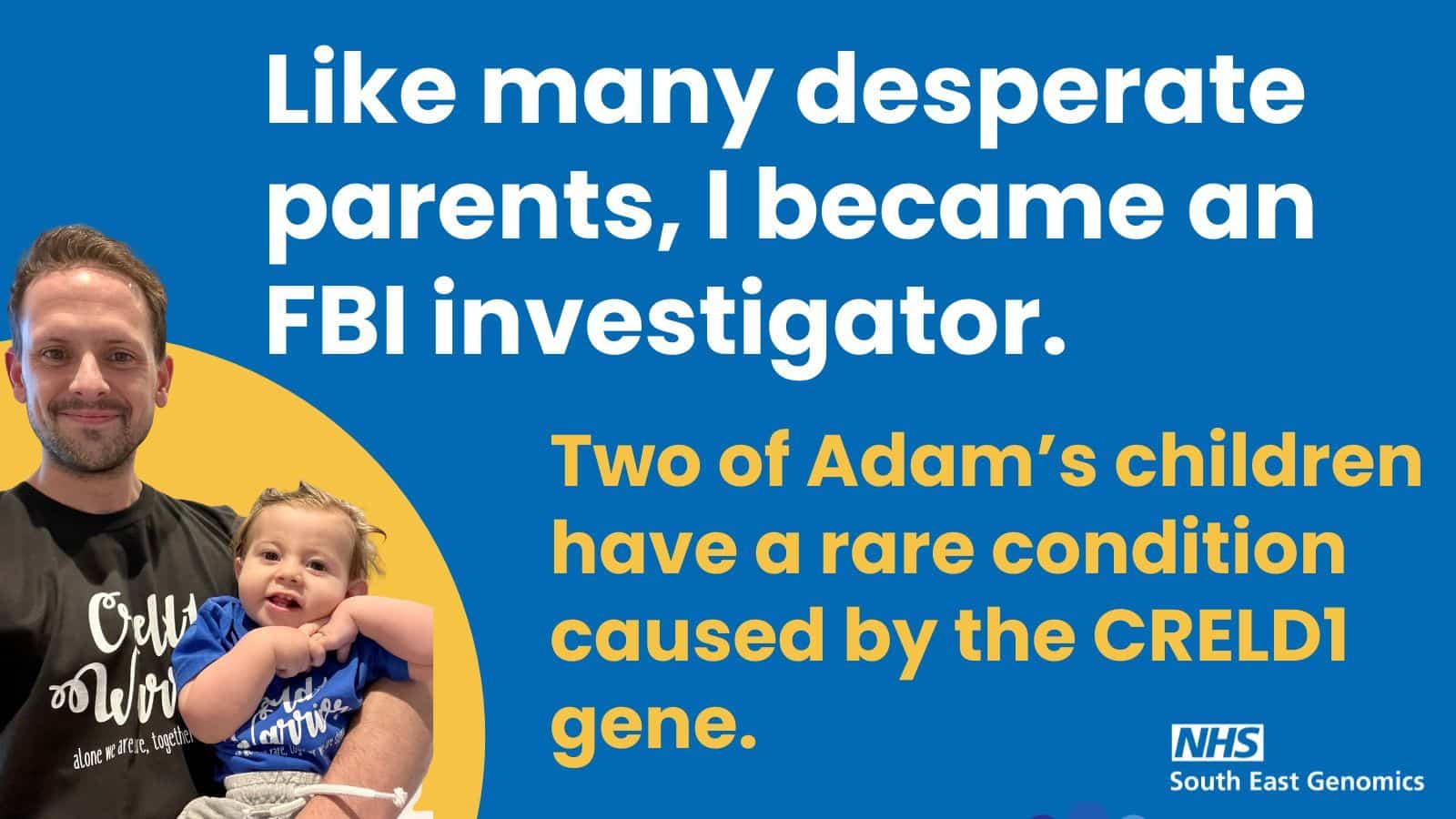Read Adam's story about seeking a diagnosis for his children who were the first in the UK to be diagnosed with CRELD1.

Adam and his wife Jess gave birth to Lola in May 2018. They were already parents to Daisy and were looking forward to expanding their little family. But their joy quickly turned to desperation when Lola’s struggles started.
“Lola had her first seizure when she was just three months old. She was failing to hit her developmental milestones, was struggling with feeding and quickly started experiencing upwards of 80 myoclonic twitches a day. We had no idea what was going on and nor did the doctors. We didn’t even know what myoclonic meant!”
Adam & Jess spent the next two years in and out of hospital asking questions that no-one could answer. Multiple tests, including ECGs, EEGs, MRIs and genetic testing, both on the NHS and privately, didn’t offer any new information either.
“Once they finally confirmed that Lola was having seizures, we tried a whole range of anti-epilepsy medications, but nothing worked. Lola was struggling to feed and develop and she was having so many seizures every day. Like many parents, I became an FBI investigator. I turned to social media and joined many epilepsy groups in the hope of finding some answers.”

By pure chance, a mum in Canada responded to Adam’s Facebook post because she recognised the seizure symptoms in her own son. Her son had a very rare condition called CRELD1.
“We quickly established many similarities in our children’s symptoms and experiences. This proved to be a far more reliable source of intel than what we gathered from any of the clinicians. We requested for Lola to be tested for CRELD1, but without any medical literature connecting CRELD1 to epilepsy, it wasn’t treated as significant information.”
Adam and Jess kept talking to the mother in Canada, convinced there was a link, but they continued with their investigations into Lola’s struggles. Without a diagnosis, and with no indication that Lola’s condition was genetic, Adam & Jess had a third child, this time a little boy called Alfie.
Four days after Alfie was born, Lola passed away in her sleep from SUDEP, a tragic outcome for many children diagnosed with severe epilepsy. Whilst grieving for Lola, they also realised that Alfie, although stronger than his sister, also had the same symptoms. He had his first seizure at three months old.
"We quickly established many similarities in our children's symptoms and experiences. This proved to be a far more reliable source of intel than what we gathered from any of the clinicians."
“History was repeating itself. We were still in the same nightmare. We again asked our geneticist to test for variations in the CRELD1 gene.” Both Lola and Alfie were found to have the CRELD1 variation. They were the first children in the UK to be diagnosed with CRELD1.
CRELD stands for Cysteine Rich With EGF Like Domains 1. It’s a protein coding gene. Changes to the gene causes an extremely rare genetic disorder triggering a wide range of complications including heart issues, seizures, respiratory issues and neuromuscular complications. There is no known cure.
“Whilst this diagnosis has simply turned our lives upside down, we have found an incredible community of inspirational families from across the U.S, Canada and UK that are all caring for children with CRELD1. These families give us hope, ideas, love and support. The diagnosis has enabled that to happen.”
Since then, Adam & Jess have set up a charity called CRELD1 Warriors to connect other families. They are also part of a research study with Yale University & GeneDx which has just published its research and evidence for CRELD1.
“Less than 20 children have been diagnosed with CRELD1 around the world, so when we talk about this being a rare disease, we are, in scientific terms, talking about something that is extremely rare. Through social media we have created a group that has been a lifeline to us, and others faced with the challenges CRELD1 brings. This group is now part of our new extended family, helping us all to learn as much as possible.”
The CRELD1 paper, alongside Adam & Jess’ continued hard work, means that when people have genetic testing, CRELD1 will now be one of the genes that is tested. Thanks to them, other families will also receive the diagnosis that they need.
While CRELD1 is extremely rare – we want to encourage families to share their story and create a place where they can find relevant information.